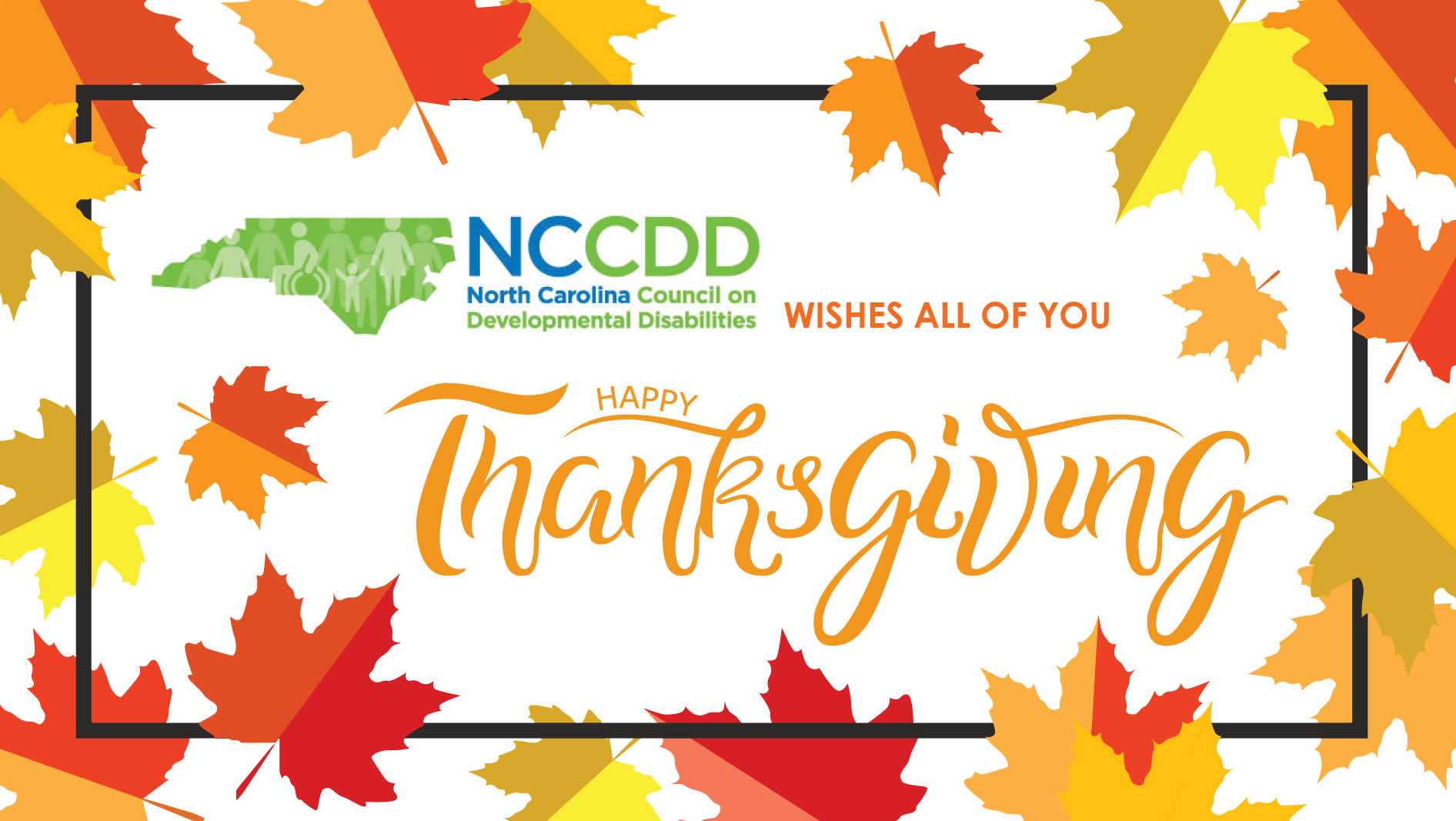November 2018 - Highlights and Hot Topics

A Message from NCCDD Chair Alex McArthur
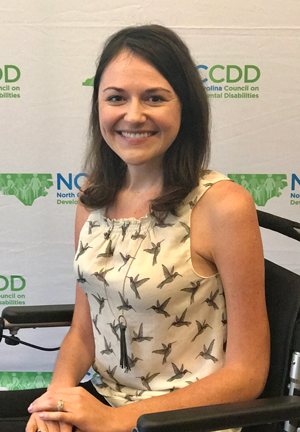 NCCDD Chairperson Alex McArthur
NCCDD Chairperson Alex McArthur
It is with great excitement the North Carolina Council on Developmental Disabilities (NCCDD) prepares to step over the threshold into 2019!
We begin the year with knowledgeable and driven Governor-appointed Council members that help in leading NCCDD’s statewide advocacy efforts and systems change. Four additional Council members were appointed in 2018: Dawn Allen, Kristy Locklear, Allison Dodson and Ryan Rotundo. You will be meeting our newest Council members in the coming months right here in Highlights & Hot Topics.
This new year also brings us into year three of our Five-Year State Plan which continues to address increasing financial security and asset development, community living and increased advocacy for people with intellectual and other developmental disabilities (I/DD) throughout the state of North Carolina. We currently fund various initiatives that help us reach the plan’s goals.
Our new year will also bring about new leadership as we are in the midst of searching for and preparing to interview candidates to fill the position of Executive Director of NCCDD. We are confident we will find the right leader to take our Council in the strong direction we have set for the state of North Carolina. We will continue to accept applications for the position until Dec. 27, 2018.
As we wrap up a very successful 2018, I want to say thank you to our members, to the NCCDD office staff, and to all of you who hold our mission close to your heart. Thank you for your advocacy work throughout the state of North Carolina! Happy New Year!
Alex McArthur
Chair
LEGISLATIVE
The November elections resulted in the Republicans losing the supermajority in both the House and Senate. While the Republicans still have the majority, they no longer have the supermajority which is defined by having 3/5th of the seats. The supermajority is significant because it is the margin necessary to override gubernatorial vetoes. This change may create more opportunity for bi-partisan negotiation and compromise.
One of the constitutional amendments that passed was the voter ID amendment which read, "Voters offering to vote in person shall present photographic identification before voting. The General Assembly shall enact general laws governing the requirements of such photographic identification, which may include exceptions.” The concern that some had with this amendment was that it contained no implementing legislation. So, the concept of "Voter ID" was approved without specifics about what it would look like in practice. The legislature is coming back for a Special Session on November 27th and legislation outlining the specifics is expected. The Council’s concern is that people with disabilities are more likely to not have a photo ID, so we will be monitoring the development of this legislation.
STATE
Medicaid Transformation
As highlighted in the last issue, Requests for Proposals for Operations of the Standard Plan for Medicaid went out. Proposals have now been received by the Department of Health and Human Services (DHHS). Proposals came from the following:
- Aetna
- AmeriHealth Caritas North Carolina
- BCBS NC-Healthy Blue
- Carolina Complete Health (provider-led group under the N.C. Medical Society)
- My Health by Health Providers (provider-led network of 12 N.C. hospital systems)
- Optima Health
- UnitedHealth Care
- WellCare Health Plans
As a reminder, the plan is to have four statewide plans and up to 12 regional plans. DHHS will make a decision on the proposals in February 2019.
There is on-going work, through a DHHS internal workgroup, on the Tailored Plan which will serve people with I/DD, serious mental health issues and serious substance use disorders. Our understanding is that individuals with I/DD who are currently receiving supports through Innovations or state-funded services and those who are on the Registry of Unmet Needs will be assigned to the Tailored Plan. Services include: behavioral health, physical health, I/DD services, TBI services, Long Term Supports and Services and pharmacy. The plan also includes a specialized health home model to ensure strong care management for people in Tailored Plans. This plan will not go into effect until a year after the implementation of the Standard Plan.
There continues to be an opportunity to provide input about the Tailored Plan.
Public Comment on Innovations Waiver - Deadline is 11/22
The North Carolina Department of Health and Human Services, NC Medicaid Division of Health Benefits is seeking the public's comments on the Innovations 1915(c) Waiver. Comments on the waiver may be submitted by email or voicemail from October 23, 2018 - November 22, 2018. The North Carolina Innovations Waiver is a means of funding services and supports for people with intellectual and other related developmental disabilities that are at risk for institutional care in an Intermediate Care Facility for Individuals with Intellectual Disabilities (ICF-IID). NC Innovations is authorized by a Medicaid Home and Community-Based Services (HCBS) Waiver granted by the Centers for Medicare and Medicaid Services (CMS) under Section 1915 (c) of the Social Security Act.
Email: [email protected]
Phone: 919.855.4968
Note: Requests for copies of the Innovations 1915(c) Waiver can be made via email or voicemail.
FEDERAL
Each election we see just how much every vote counts. Election night may have been November 6th, but votes continue to be tallied in several tight races across the country. While some seats have yet to be certified, it appears the Republican party will retain leadership of the US Senate and Democrats will now control the US House. Looking at North Carolina’s delegation for the upcoming 116th Congress, very little has changed. Senators Burr and Tillis were not up for reelection this year. In the House, incumbents held their seats in all, but the 9th District where Mark Harris prevailed over fellow Republican Representative Pittenger. What North Carolina’s Congressional districts will look like in the future remains uncertain, however. Current Congressional maps were deemed unconstitutional by a panel of federal judges, and cannot be used after the 2018 election. This ruling has been appealed to the Supreme Court.
The current 115th Congress returns for a “lame duck session.” While many priorities exist for both parties and the President, funding for many parts of the government will expire in early December without a continuing resolution. Money Follows the Person state grants require reauthorization to continue funding, and several key programs including the Supplemental Nutrition Assistance Program (SNAP, often referred to as food stamps) wait as the House and Senate try to reconcile competing visions.
Application Open for State Consumer and Family Advisory Committee Vacancy
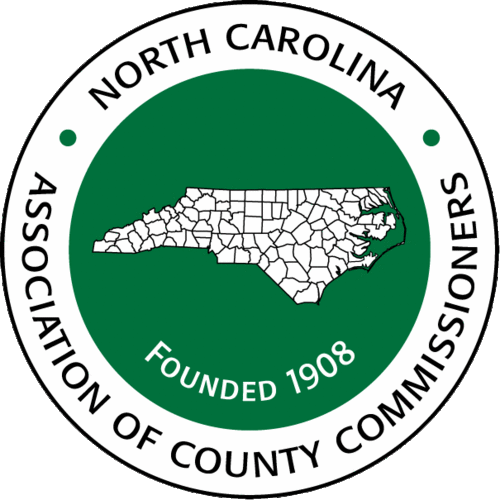 The NC Association of County Commissioners has a State Consumer and Family Advisory Committee (SCFAC) Vacancy for the Eastern Region. The term is from the date of appointment until June 30, 2021. The SCFAC is a 21-member group of consumers and family members appointed to advise the NC General Assembly and the NC Department of Health and Human Services on the planning and management of the State's public mental health, developmental disabilities and substance abuse services system.
The NC Association of County Commissioners has a State Consumer and Family Advisory Committee (SCFAC) Vacancy for the Eastern Region. The term is from the date of appointment until June 30, 2021. The SCFAC is a 21-member group of consumers and family members appointed to advise the NC General Assembly and the NC Department of Health and Human Services on the planning and management of the State's public mental health, developmental disabilities and substance abuse services system.
The counties are in the Eastern Region: Beaufort, Bertie, Bladen, Brunswick, Camden, Carteret, Chowan, Columbus, Craven, Cumberland, Currituck, Dare, Duplin, Edgecombe, Gates, Greene, Hertford, Hyde, Johnston, Jones, Lenoir, Martin, Nash, New Hanover, Northampton, Onslow, Pamlico, Pasquotank, Pender, Perquimans, Pitt, Robeson, Sampson, Scotland, Tyrrell, Washington, Wayne and Wilson County.
If you or any one you know is interested, please complete the application at: https://www.ncacc.org/FormCenter/Get-involved-2/SCFAC-Appointment-Application-54
Public Policy Keynote Address to Mayor’s Committee
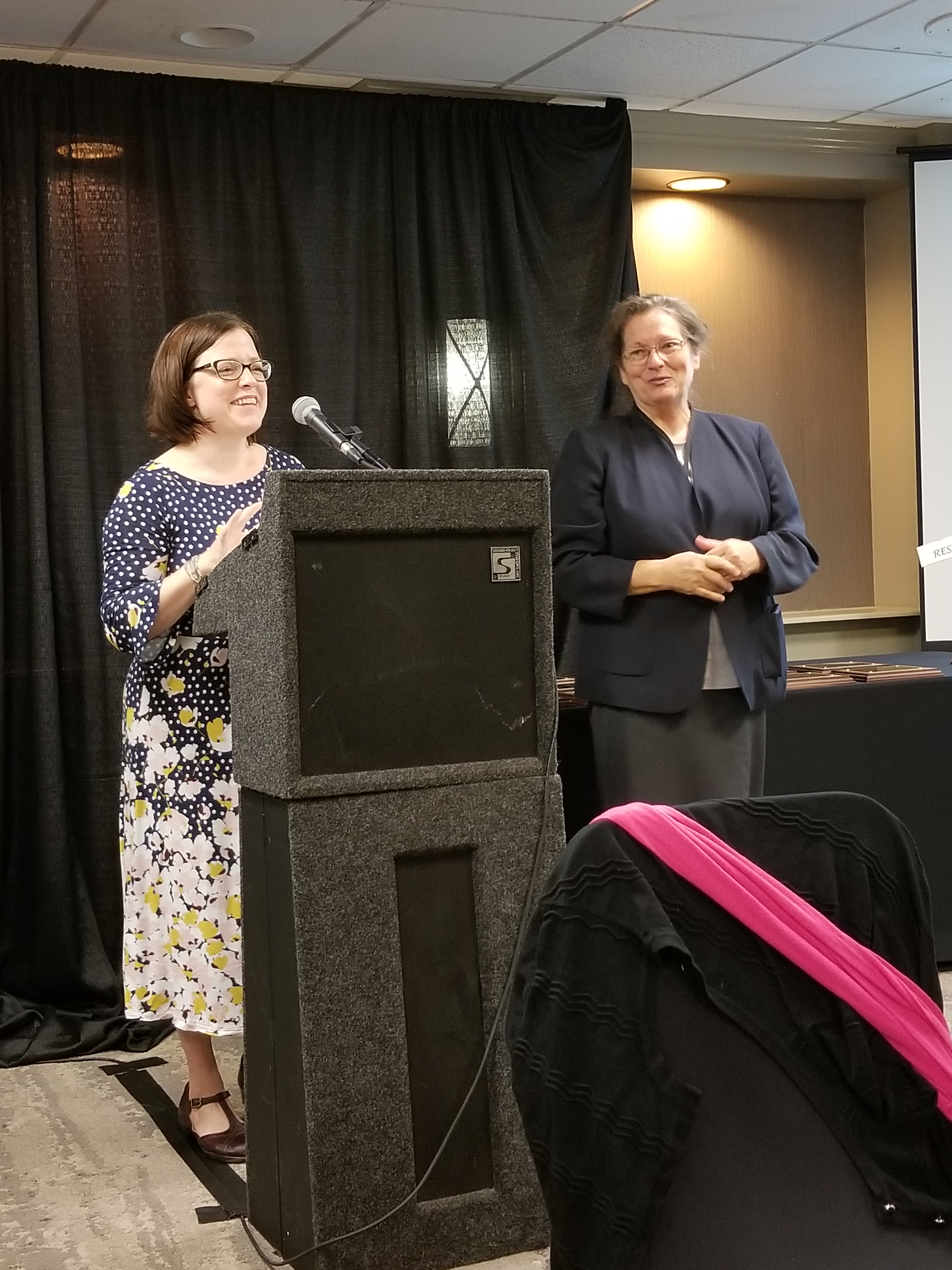 Erika Hagensen provides keynote. On October 30, NCCDD’s Public Policy Consultant, Erika Hagensen, gave the keynote address at the Raleigh Mayor’s Committee for Persons with Disabilities’ Annual Awards Banquet in Raleigh. Erika asked attendees to commit to ending the erroneous descriptor of “special needs” when referring to individuals with disabilities.
Erika Hagensen provides keynote. On October 30, NCCDD’s Public Policy Consultant, Erika Hagensen, gave the keynote address at the Raleigh Mayor’s Committee for Persons with Disabilities’ Annual Awards Banquet in Raleigh. Erika asked attendees to commit to ending the erroneous descriptor of “special needs” when referring to individuals with disabilities.
All people want a quality education, meaningful job opportunities, affordable housing, the ability to get around town and significant relationships in their lives. How we achieve these outcomes is what varies from person to person. While celebrating past successes and congratulating award winners on their current innovation and partnership, Hagensen encouraged attendees to identify persistent barriers and excluded populations and focus on those shared human needs that connect us to one another.
In addition to Hagensen, Mayor’s Committee Chair Robert Owens provided the opening remarks, and Mayor Nancy McFarlane welcomed all attendees. Rabbi Raachel Jurovics led the invocation by sharing a Jewish blessing that speaks to the importance of recognizing diversity. Joel Brown of ABC11 emceed the event by presenting 14 awards in categories such as Employer of the Year, Excellence in Transportation and Excellence in Housing. Sharon Benton accepted the Lockhart Follin-Mace Advocacy Award on behalf of her husband and longtime Mayor’s Committee Chair, James Benton, who passed away last November.
NC Council on Developmental Disabilities Awards Advocates Throughout the State
The North Carolina Council on Developmental Disabilities (NCCDD) held its annual awards event on November 7, 2018 at the Hilton Garden Inn, Cary, NC. Three people from the state of North Carolina were honored for their work and advocacy on behalf of individuals with intellectual and other developmental disabilities (I/DD).
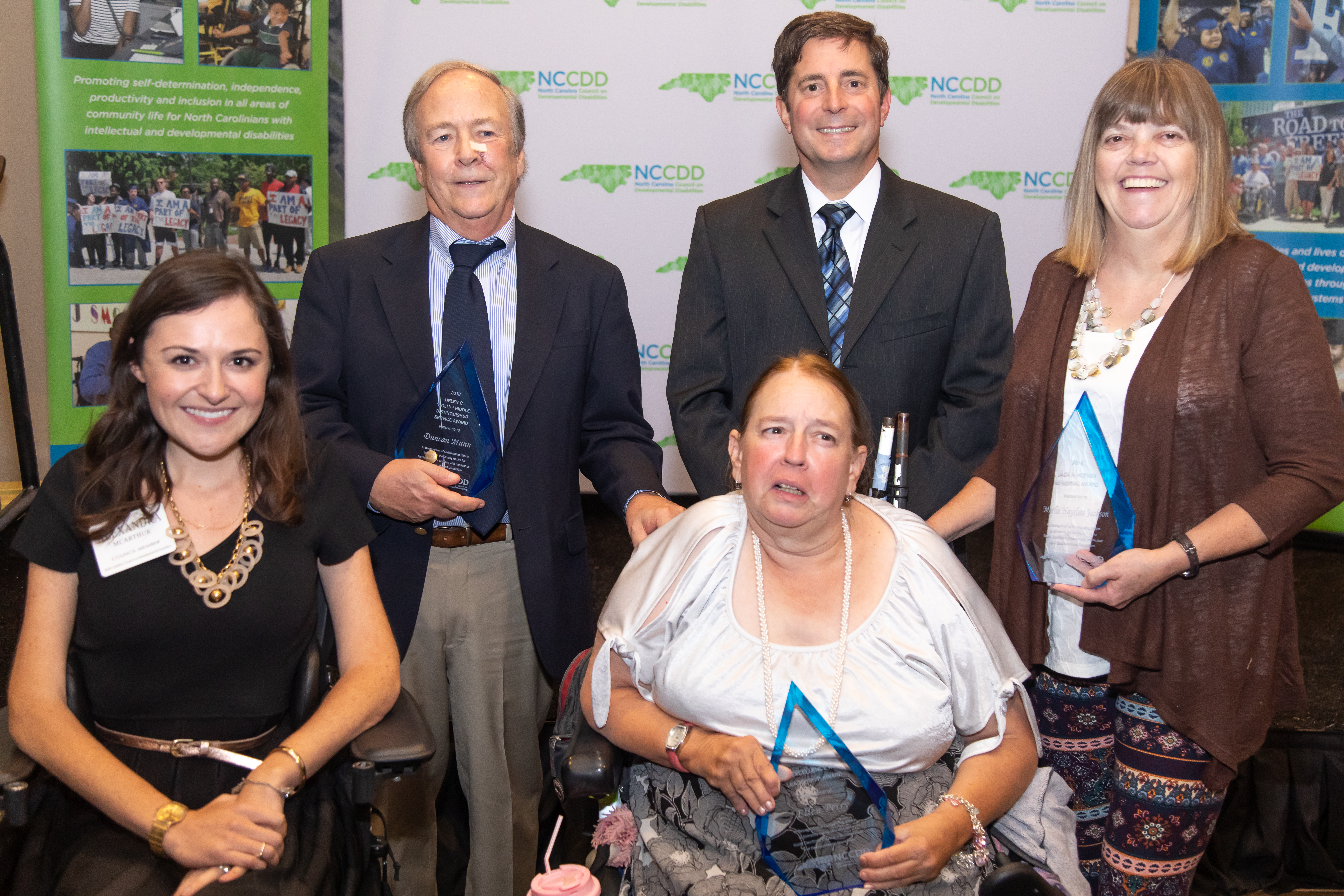 2018 NCCDD Advocacy Leadership Awards Honorees with NCCDD Chair Alex McArthur and Chris EganPresented for the first time, NCCDD’s North Carolina Leadership Achievement Award was given to former Council member, Ellen Perry. The award is given to an outstanding North Carolina self-advocate whose work has improved the quality of life for people with intellectual and other developmental disabilities. Perry, a resident of Carrboro, NC, has been instrumental in working with the city’s leadership to implement community changes to benefit people with I/DD in navigating the city. Perry served on the state and national boards of the Association of People Supporting Employment First (APSE) as well as on the NC Association of Self-Advocates, the Southern Collaborative (an 11-state board addressing disability issues), the Carrboro Transportation Advisory board and state and local Consumer Family Advisory Committees.
2018 NCCDD Advocacy Leadership Awards Honorees with NCCDD Chair Alex McArthur and Chris EganPresented for the first time, NCCDD’s North Carolina Leadership Achievement Award was given to former Council member, Ellen Perry. The award is given to an outstanding North Carolina self-advocate whose work has improved the quality of life for people with intellectual and other developmental disabilities. Perry, a resident of Carrboro, NC, has been instrumental in working with the city’s leadership to implement community changes to benefit people with I/DD in navigating the city. Perry served on the state and national boards of the Association of People Supporting Employment First (APSE) as well as on the NC Association of Self-Advocates, the Southern Collaborative (an 11-state board addressing disability issues), the Carrboro Transportation Advisory board and state and local Consumer Family Advisory Committees.
The Jack B. Hefner Memorial Award is given to celebrate the vision and achievement of North Carolina's families and people with I/DD. This year, the award was presented to Merlie Jackson of Wilkesboro, NC, for her tireless efforts in supporting the National Tay-Sachs & Allied Diseases Inc. (NTSAD). The organization seeks cures for many diseases including Gangliosidosis GM-1 which Jackson’s daughter, Jessie, has. Jackson creates and hosts an annual “Ride for Jessie” motorcycle ride throughout the hills of central Carolina to raise thousands of dollars for a cure. The riders end up at the Jackson homestead for a barbecue and fellowship in support of Jessie. This year’s Ride for Jessie raised over $6,000. Jackson also is a key figure at the annual NTSAD Annual Family Conference where she offers assistance and advice to other parents whose children have GM-1.
Duncan Munn was honored with the Helen C. “Holly” Riddle Distinguished Service Award. The award is the highest recognition given by the Council to those professionals who have made lasting contributions towards improving opportunities, breaking down barriers and promoting increased quality of life for people with intellectual and other developmental disabilities. Munn’s extensive work in North Carolina includes developing a premier early intervention program for infants and toddlers with I/DD, a first for North Carolina and the nation. Now retired, Munn, a resident of Raleigh, NC, helped create Beyond Academics, a program at UNC-Greensboro which supports students with I/DD in earning a four-year certificate of study that emphasizes self-determination, life planning and career development.
“Our Council is honored to recognize Ellen Perry, Merlie Jackson and Duncan Munn with our 2018 awards for each of their long-term commitments in supporting people with disabilities. Their work to educate and change attitudes throughout the state of North Carolina is outstanding. Thanks to their efforts, the talents of people with intellectual and other developmental disabilities will be felt throughout our state. The Council celebrates their commitment and their impact,” said Alexandra “Alex” McArthur, chair of the North Carolina Council on Developmental Disabilities.
Watch their stories below:
NCCDD Releases 2018 Annual Report
The Council has released its most current annual report that gives an in-depth overview on NCCDD's 2017-2018 year. The report covers a look at the second-year accomplishments of the Five-Year Plan as well as highlights many of the major events of the year including An Evening with the Council in Asheville, as well as a recap of our newest initiatives.
